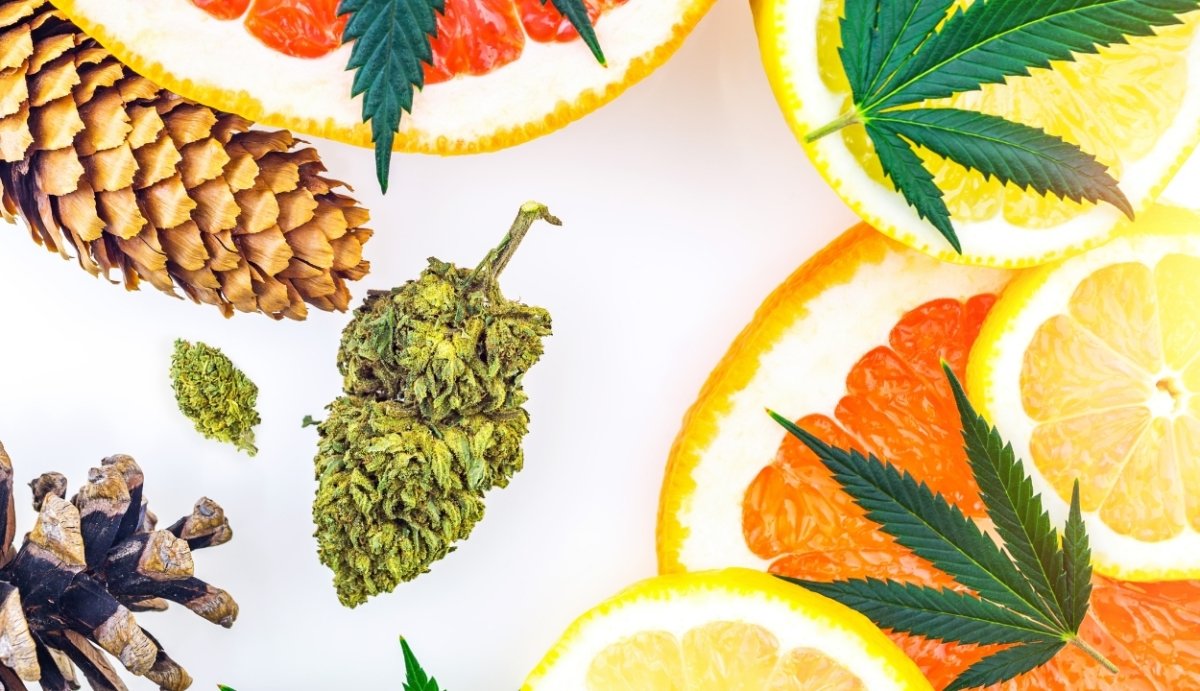Your Cart is Empty
FREE SHIPPING ON ALL ORDERS $75+
You may have already heard of THC-O–Delta-8’s ultra-potent (and federally legal) cousin. The effects are heady and intoxicating on their own–but what about when you add terpenes? THC-O with terpenes added is gracing the market everywhere, and we’re going to explain why it matters and how terpenes change the THC-O experience for the better. Let’s jump in:
Table of ContentsTHC-O is a hemp-derivative with highly potent psychoactive effects (about three times more potent than traditional Delta-9-THC) but it isn't naturally extracted like CBD, CBG, or other hemp cannabinoids. Instead, THC-O is made through a process called isomerization, or the process of transforming one cannabinoid into another. This process is perfectly safe and can create a high-quality THC-O product when carried out by an experienced cannabinoid manufacturer, but it has one caveat–all of the original hemp material is removed.
The material made through this isomerization process–THC-O distillate–is highly pure and potent, but lacks the aromatics, flavor, and diversity of the original cannabis material. So, ultimately, manufacturers add certain cannabis derivatives (and other ingredients) to the distillate to create products that are fragrant, flavorful, and uniquely therapeutic. This is where terpenes come in.
Terpenes are the aromatic compounds naturally found in the cannabis plant, primarily in the trichomes, or hair-like structures on the cannabis flower. There are more than 150 terpenes found in the cannabis sativa family of plants, with 100 or more appearing in each cannabis flower. Terpenes aren't necessarily unique to cannabis, however. In fact, terpenes are the aromatic compounds found in all plants, and are the compounds extracted to create essential oils and other plant-based fragrances.
In the plant, including the terpenes that are naturally present in cannabis, they play the important role of attracting pollinators and repelling pests. Even better, research suggests that terpenes may each have unique therapeutic potential. One popular theory, called the “entourage effect” suggests that terpenes even have synergistic effects with cannabinoids.
So much so, in fact, that different terpene profiles are typically recommended and preferred for treating different ailments. For instance, a strain with a high myrcene content may be preferred for improving sleep, while a strain with plenty of beta-caryophyllene may be chosen for taming inflammation.
Here’s a quick breakdown of the most common terpenes and the effects they may offer. Keep in mind that combining different terpenes and cannabinoids will also create a different range of effects, also known as “the ensemble effect.”
Most commonly, though, people look at the entire strain profile to help determine the general effects of the THC-O formula, meaning you may choose a sativa leaning strain when you want to be uplifted and cognitively energized or an indica strain when you want to relax and unwind. Hybrid strains may fall somewhere in the middle and provide more balanced effects.

We want to set the record straight off the top–there are no strains that are better than others, and all terpenes have a role to play in cannabis products. In reality, choosing the best strain has a lot to do with your personal preference and needs, and you may have to try different strains to better understand how they’ll affect you.
Sour Diesel, for instance, is a hard-hitting, uplifting, and energizing strain that has significant cerebral effects, while Royal Purple Kush terpenes induce a euphoric body high that’s relaxing and sedating.
You can find a wide variety of THC-O formulas that include various terpene blends, but most commonly terpenes are added to vapes, concentrates, and THC-O flower. This is because terpenes add an aromatic touch to the vaping and smoking experience, but don't necessarily improve the flavor of edibles. Some edibles may include terpenes for therapeutic purposes, but the pungent flavor of most terpenes is usually a deterrent from adding them to oral formulas.
In general, terpenes make up a small portion of the THC-O formula. For instance, our THC-O vape formula is about 95% distillate, with the other 5% reserved for terpenes.
Many people wonder if the terpene dosage matters. In other words, do you need to change your THC-O dosage when there are terpenes added. The answer is usually no–the amount of terpenes added to most THC-O formulas is minimal and will not impact the overall THC-O dose. Keep in mind that THC-O is highly potent, and you probably need a smaller dose than you’re used to when dosing either Delta-9 or Delta-8. For information on THC-O dosing, read “How Much THC-O Should I Take?

You can find lots of THC-O products on the market (most of which contain some amount of Delta-8-THC), but not all of them contain terpenes. THC-O will still give you psychoactive effects on its own, but if you want a more tailored experience, you need to find a terpene blend that meets your needs.
Our THC-O vaporizer formula consists of 5% hemp-derived terpenes for strain profiling. Choose from the Sativa, Hybrid, and Indica varieties and enjoy the fast-acting, hard-hitting benefits of a terpene-tailored vapor dose.
Looking for terpene-infused Delta-8 flower? Check out our Elev8 Collection.Comments will be approved before showing up.



